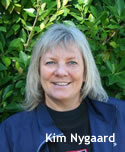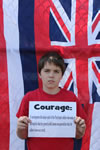2012 PARALYMPICS AT PENINSULA
HERITAGE SCHOOL
written by Kim
Nygaard, Peninsula Heritage School
 "Everyone
is different" is something I used to hear growing up,
and is now something I teach. Being an athlete most of my
life and participating in competition levels ranging from
youth sports, to High School, to College, and then adult international
sports, I have always been driven to compete - in my mind
- compete to win! What would happen if all that was somehow
taken from me at an early age? "Everyone
is different" is something I used to hear growing up,
and is now something I teach. Being an athlete most of my
life and participating in competition levels ranging from
youth sports, to High School, to College, and then adult international
sports, I have always been driven to compete - in my mind
- compete to win! What would happen if all that was somehow
taken from me at an early age?
Being a physical education teacher/coach
for more than 30 years, I have observed students and athletes
on different levels. I have taught basic skills including
locomotors, rhythms, ball, jump roping, fitness and more.
As the years went on I realized just how important not only
teaching sport skills to children was, but to emphasize that
their social, life skills (including self-esteem, confidence,
and character) was going to be the defining line to their
success.
Every year I bring to my PE classes,
and to the conferences I speak at, a new and innovative way
to teach all these skills to the children. I began introducing
real life adventures to my classes. I made PE fun and a worldly
experience. I started off with my Survivor…PE
Style years ago, forming tribes, and introducing
the simplicity and difficulty in working cooperatively and
competitively within a group with "different" athletic
abilities. Not only were the challenges physical but also
mental, using strategies of memory, common sense, and logic.
Other adventures I have brought to my classes include:
- Amazing
Race around the world
- Iditarod Dog Sled Race of Alaska
- Pirate's Adventures
- Passport to Play around the world
- Art of archery
- Summer & Winter Olympics
This year for our metric week celebration, I introduced
the children to the Tour de France and set up a 21
stage Tour de France on tricycles. I also used a trick bike
and a spin bike. Not only did we learn about the race, we
experienced it.
Every year, as we move into our physical fitness unit, it
saddens me to see how children don't like to run, or doing
sit ups and pushups seem more a job of low enjoyment to them.
I have never seen children try to get out of working out.
The understanding of child obesity is not a concern to them.
I guess my frustration level was reached when a young child
(elementary) said "I'm too tired to run; I don't want
to run anymore!" That's when I decided to introduce the
"Paralympic Games" to the children.
Over the summer I started researching paralympic athletes
and events. I was so intrigued with all the information that
was out there, and realized I needed to teach my children
more about what is outside of their comfort level and community.
In doing this research it brought me back to my younger days
working camps with children having disabilities. I also worked
with Special Olympics. Special Olympics differ from Paralympics.
The Special
Olympians has intellectual disabilities whereas the Paralympians
has physical disabilities. I think the hardest part of having
and competing with a disability is other people's attitudes.
I watched some YouTube videos and listened to what the athletes
said.
Before starting our Paralympics, I had the children research
a paralympic athlete. We talked about the athlete's disability
and how it affected their performance. It was an eye opener
for my children when they learned that some of these athletes
were not disabled until an accident occurred. Some who were
researched were:
- Beth
Arnoult - wheelchair tennis (paralyzed in an ATV accident)
- Mark
Barr -Swimming (lost his leg to a tumor at age 14)
- Eric
Bennett - Wheelchair Archery (lost his rt. Arm above
the elbow in a bad roll over car accident, age 15)
- Jim
Bob Bizzell (one of my favorites) - Track (lost part
of his leg in motorcycle accident)
- Cody
Bureau - swimming (farming accident lost his hand)
- Scot
Hollonbeck - Cycling (spine was smashed by a drunk driver,
age 15
We had an Opening Ceremony and the children chose their events.
We discussed the Paralympic symbol and motto. We hung flags
from around the world. The children participated in 4-6 events.
Visit the Paralympics
in London 2012 site to see a description of the events.
Below are the events I used, and how I had to use my creativity
for these events.
- Table
Tennis: I used portable nets on long tables.
The children’s paddles were tied to the back of their
hands. They had to try and hit the ball off the paddle (this
gave them a sense of playing with no hands).
- Wheelchair
Fencing: The children sat in chairs Indian
style. They used pool noodles to jab at each other. They
had to use one hand only; the other hand was behind their
backs (This gave them the understanding of how important
legs are for power and strength. When they don't have legs,
they found their balance and strength were not present.).
- Sitting
Volleyball: I lowered a net and they tried
playing volleyball sitting down. We also practiced as visually
impaired athletes and had a sheet over the net (This helped
with their concentration levels.).
- Wheelchair
Boccia: The children sat in chairs Indian styles.
They rolled the balls out to see who could get closest to
the small white ball (This once again was difficult because
you don't have the support of your legs for strength and
balance.).
- 5
on 5 Soccer: I made a ball by placing bells
inside. This game is for the blind and partially blind athletes.
I found black glasses that had pin holes in them which were
very difficult to see through. It worked perfectly for the
children to be partially blind. The goalies had blindfolds
on. (This was a silent game where other senses were brought
into the competition. Hearing the ball and reacting to the
bells was quite frustrating to the children who realized
having no disabilities was much easier.)
- Goal
Ball: I used the balls I made with bells inside.
One team were the goalies and the other team were the shooters.
The children were blindfolded and tried to make goals by
the defenders, who were also blindfolded trying to save
the goals. (I think this was a favorite. It was quite difficult
playing in silence for the most part. Children love to cheer
and make noise, but in a competition with blindness they
had to use self control and keep quiet.)
I feel this was my BEST PE Adventure yet.
I felt a sense of accomplishment and success as I watched
the children compete. For some children it was exciting and
fun. Other students had a difficult time and wanted to compete
with their whole abilities, not just some. It was an eye opener
to them and has opened up a whole new aspect of athletes.
I am sure they will watch the London 2012 Paralympics this
summer and have a greater appreciation for people who are
different.
Hope you have enjoyed my article, and will participate in
observing the Paralympics this summer. We can all ask ourselves,
as I did in my first paragraph, "What would happen and
how would I respond, if all my competition goals & dreams
were somehow taken away from me with a terrible accident?"
Could you answer that for yourself?
Be careful and enjoy the beautiful spring outdoors. Enrich
your students with more than sport specific skills. As times
rolls on and cutbacks are still being made - what are the
students in your classes getting out of PE? Hopefully you
are taking them out of their comfort zones and educating them
to the wide world around them.
(back
to pelinks4u homepage) |





















 "Everyone
is different" is something I used to hear growing up,
and is now something I teach. Being an athlete most of my
life and participating in competition levels ranging from
youth sports, to High School, to College, and then adult international
sports, I have always been driven to compete - in my mind
- compete to win! What would happen if all that was somehow
taken from me at an early age?
"Everyone
is different" is something I used to hear growing up,
and is now something I teach. Being an athlete most of my
life and participating in competition levels ranging from
youth sports, to High School, to College, and then adult international
sports, I have always been driven to compete - in my mind
- compete to win! What would happen if all that was somehow
taken from me at an early age?